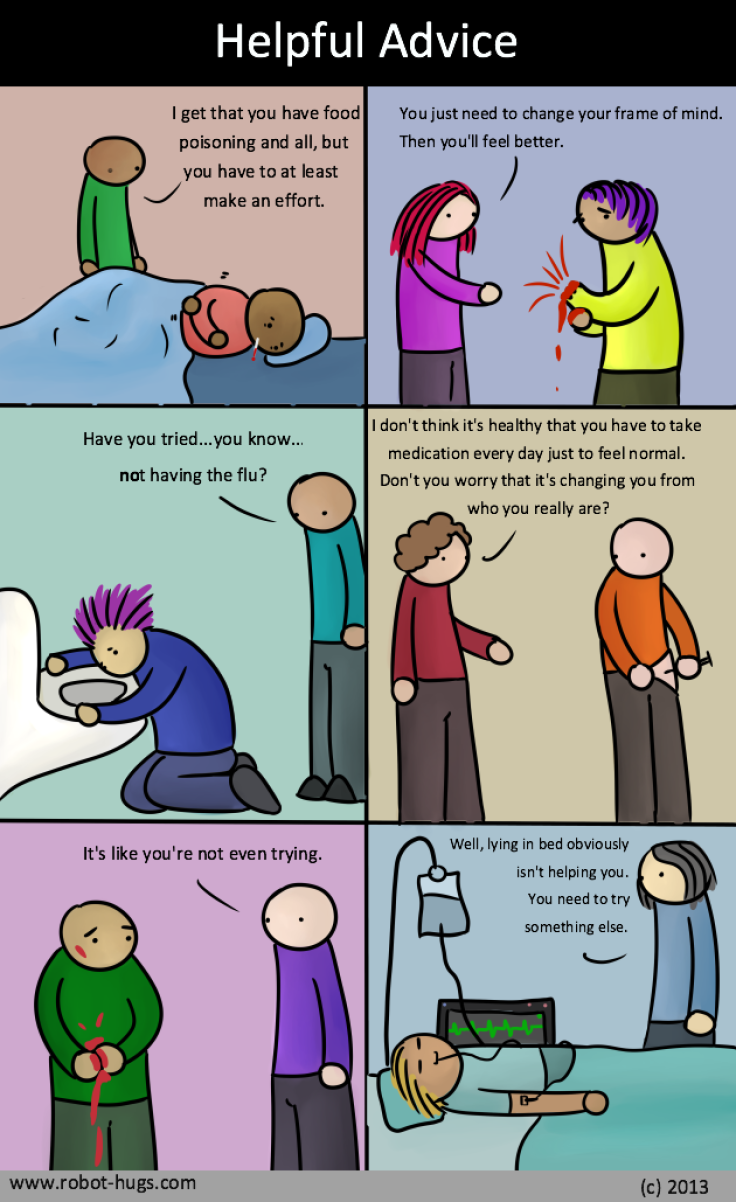With Obamacare Enrollment At A High, Erasing The Mental Health Stigma Becomes All The More Important

I woke up one morning after having a nightmare with a painfully sharp cramp in my stomach. The nightmare’s dredges still hovered in my periphery, dark and hazy. I sat up and stretched, but the stitch persisted and got worse.
As the pain worsened, I wondered if I had an ulcer. Shortly after, I began panicking. I’d been through this before, but each time a panic attack hits, it feels like something I’d never experienced before. Was I dying? Was I going to pass out in my room where no one could find me? Why, suddenly, was I unable to breathe fully?
The panic attack; something that people with anxiety experience every few days, and for some, every single day. When panic attacks begin, they often do so subtly, sneakily, and without you realizing it. While you’re on a crammed train, nausea and lightheadedness arrive out of nowhere, the suddenness of which terrifies you. You become hyperaware against your own will. Physical symptoms include hyperventilation, dizziness, headache, rapid heartbeat, tingling in your limbs. Your throat chokes up, your muscles tense up, you can’t breathe. The feeling that you’re about to die consumes you.
During that time I experienced the stomach cramp, I only thought of sudden danger and impending doom. I had to get to a doctor immediately, because at some point the cramp in my stomach had turned into an excruciating pain I’d never experienced before.

I arrived at the urgent care walk-in in a sorry state — a tangle of panic and abdominal pain. But after a series of quick-and-dirty tests, the doctor concluded there was nothing wrong with me. I was written off as anxious. The doctor, indifferent and condescending, said, “You better realize this is just anxiety before you come into the doctor’s office next time.” In other words, she basically said, "Don’t waste my time."
I felt dismissed and idiotic, and of course, still anxious. But so many questions remained: How could “just anxiety” cause that terrible pain in my stomach? Why would “just anxiety” make me feel as though I was about to keel over and black out? I left the doctor’s office no better for the wear, went home, and collapsed from the exhaustion that anxiety can cause after it riddles and wrecks your body. After that experience, I noticed more and more — and heard stories from friends with anxiety — that there was, indeed, something inherent about anxiety that makes it easy to dismiss in the doctor’s office.
The Stigma
It turns out there’s a stigma when it comes to anxiety; similar to that surrounding many other mental illnesses that are often discredited and dismissed. According to the Centers for Disease Control & Prevention (CDC), only 25 percent of people struggling with mental health problems say they feel that other people are compassionate and understanding toward them.
“This stigmatized trait sets the bearer apart from the rest of the society, bringing with it feelings of shame and isolation,” the CDC states. “Often, when a person with a stigmatized trait is unable to perform an action because of the condition, other people view the person as the problem rather than viewing the condition as the problem. … Stigma causes needless suffering, potentially causing a person to deny symptoms, delay treatment, and refrain from daily activities.”
This stigma contributes to the persistent vicious cycle that anxiety and depression often impose on patients. What is wrong with you? You’re crazy and paranoid, you weirdo. Stop being a hypochondriac, stupid. You should know better. Calm down. Don’t you know that it’s useless to worry so much? These are all things people with anxiety disorder have heard, at one time or another, from their family or friends. And let me tell you: it doesn’t help us. It just makes things worse.
We become extremely anxious about being anxious. We begin to dread panic attacks before they even occur, which in turn leads to panic attacks.
The thing is, you can’t just stop being anxious or being depressed. You can’t simply zap worries into nonexistence, or lift a heavy veil of depression. They cling to you, like smoke on your clothes or a fog that won’t leave your periphery. No matter what you do, how hard you try to eliminate these intrusive, anxious thoughts, they’ll always be there, in the back of your mind, directing your mind and actions on a deep, subconscious level.

Prejudicial Treatment
If you’ve ever had a poor experience with a doctor after being dismissed as “anxious,” you’re not alone. Research has shown that doctor's prejudice against patients with mental disorders exists, and it leads to poorer quality of care for those patients. One study led by a team of psychiatrists examined the quality of care among physicians who were treating both patients with a mental illness, and patients who weren’t mentally ill.
They found that “once the medical team knows a patient has psychiatric problems, they give them poorer quality of care,” Dr. Alex Mitchell, an author of the study, said. “Doctors don’t like dealing with patients with psychiatric problems. They view them as different and they spend less time with them. They don’t offer the patient the same intensity of investigation as the non mentally-ill patient. It’s prejudicial treatment.”
It’s not just in the U.S. that mental health stigma exists in the medical system. During the Canadian Medical Association's (CMA) annual meeting in 2008, Michael Kirby, former Senator and the chair of the Mental Health Commission of Canada, said, “You’d think that health care workers would be less prejudiced about mental illness than the general population. You would be wrong.”
Mental illness should be treated with the same empathy as people with a broken leg or terminal cancer. The Robert Hugs cartoon below seems to capture this well.

Removing the stigma, especially now, with the Affordable Care Act (Obamacare) attempting to get the ball rolling on mental health treatment, is essential to having an effective medical system. The burden is not just on ordinary people’s shoulders, but also on the shoulders of doctors who are guilty of dismissing patients with anxiety.
The Importance Of Mental Health Care
Stress, anxiety, and depression all have deeply physical effects, like increasing your blood pressure, your risk of heart disease, stroke, obesity, and cancer. These mental illnesses have all been shown to reduce your life span, too.
Contrary to popular belief, mental health problems that are left untreated create a huge economic burden of over $100 billion per year in the U.S., and half of all Americans will experience a form of anxiety disorder or depression at some point in their life. Left untreated, it can lead to severe depression, loss of employment, and suicide. Yet, mental health care is still largely neglected in this country.
I will give credit to where it's due: When Obamacare began rolling out, President Obama promised that mental health treatment would be vastly improved. Provisions in the Affordable Care Act now cover mental health care, where before it was much harder to access. And the Mental Health Parity Act, which requires insurance companies to offer the same coverage for mental health and substance abuse as they do for physical or surgical procedures, is a big leap forward in this country.
But overall, mental health care is still largely ignored and dismissed. While some studies and experts believe mental health treatment has seen a surge of new patients since Obamacare, others beg to differ, noting that despite all these new provisions, people still aren't getting what they need. Part of the problem is that the mental health care sector is largely understaffed, with a shortage of psychiatrists, therapists, and psychologists, particularly in rural areas of the U.S. People with untreated or undiagnosed mental illnesses are far more likely to turn to their primary care doctor, who may be likely to dismiss their symptoms or simply prescribe drugs without really trying to fully understand their emotional or psychological problems — an arena far better suited for a psychiatrist or cognitive behavioral therapist.
"There has been a long-standing shortage," Bob Carolla, a spokesman at the National Alliance on Mental Illness, told U.S. News & World Report. "Expansion of health care is a good thing, but it also means you are widening demand for it."

Perhaps people with anxiety, who report their symptoms to their doctor, should simply be listened to because, who knows, their symptoms may be the result of a real chronic physical condition. Take Lisa Smirl, a 37-year-old professor who began experiencing strange symptoms, including shortness of breath, pain, and fatigue. Countless doctors diagnosed her condition as anxiety, dismissing her symptoms as made up. It turns out Smirl really had lung cancer, and by the time doctors realized it, it had spread to other parts of her body.
Dismissing anxiety exacerbated her anxiety in a vicious cycle — it made her feel invaluable and crazy. In a blog post, Smirl described her diagnosis: “While in some ways this was a terrible surprise, in another it was a huge relief. For the last year I’d been battling a range of bizarre and seemingly disparate symptoms that had forced me in September 2011 to go on sick leave from my job as a lecturer. … The diagnosis at the time was anxiety and/or depression. And while I was, by then, both anxious and depressed, this was due to the increasingly disabling symptoms that my doctor kept insisting were purely psychological.” After fighting the cancer for a few years, Smirl died in 2013.
Smirl’s story is extremely rare and unlikely. But it goes to show that anxiety — or symptoms that come off as anxiety — should never be dismissed as a “waste of time.” If doctors had taken Smirl’s words seriously, they may have discovered the cancer earlier and saved her life. And even if, theoretically speaking, Smirl’s symptoms were truly due to anxiety, a doctor who listens, and understands the disorder, could make all the difference.
Sometimes, a bit of understanding, empathy, and acknowledgement can make you feel like you’re not crazy, and not alone. And sometimes that is the first step in the process of getting help, becoming more self-aware, and stopping the vicious cycle.



























